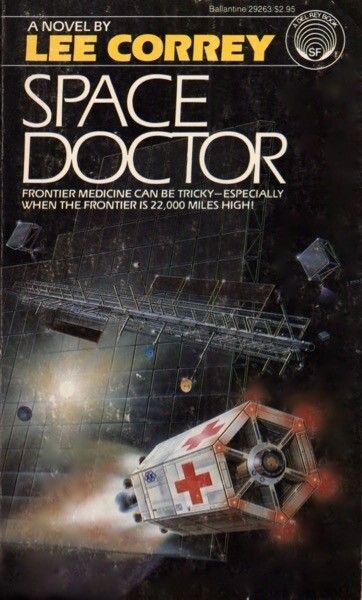Something Wrong with Me
Space Doctor
By G. Harry Stine

22 Mar, 2021
G. Harry Stine’s 1981 Space Doctoris a near-future hard SF novel. It was published under his Lee Correy pen-name.
Note recurrence of the term visionary in the following synopsis.
Democratic Senator Owen Hocksmith is a political powerhouse; he is high in the councils of New Mexico’s Democratic Party. He’s also a wealthy oligarch, with investments in ranching, banking, and high-tech industries.
One investment is looking shaky. The senator’s Eden Corporation is not subject to short-sighted antitrust laws hobbling truly visionary capitalism and secured the contract to build America’s solar power satellites. Senator Hocksmith is determined to see the project to completion and not just for the vast wealth the project can deliver. He believes nuclear war can only be staved off as long as energy is cheap. SPS (Solar Power Satellites, the company) can deliver cheap energy.
Still, the project presents unprecedented challenges. Several such challenges face Dr. Tom Noels, the project’s medical director.
Much of the construction work will take place in Geosynchronous Earth Orbit. Whereas injured personnel in Low Earth Orbit can be returned to Earth’s surface comparatively quickly, the workers in GEO are a day or more from terrestrial medical resources. GEO will need its own hospital to service the medical needs of Eden’s work staff. Hocksmith wants his old friend Noels to tackle the job.
Still grieving his late wife, Noels has sequestered himself in a remote location in America’s Southwest. He allows himself to be cajoled into accepting the position, which offers him an unparalleled opportunity to develop space frontier medicine. He agrees without fully grasping the scope of the task he faces.
Design work for the clinic has barely started. In addition to overseeing that, Noels needs to recruit staff willing and able to work in space. He must battle bureaucrats eager to kneecap visionary industrial developments with their endless red tape and inappropriate safety regulations. Nevertheless, Noel persists.
The real job begins once the clinic opens. To quote Star Cops’ Nathan Spring:
“You leave Earth and anything you forget to bring with you will kill you. Anything you do bring with you which doesn’t work properly will kill you. When in doubt, just assume everything will kill you.”
Spacesuit mishaps to acute radiation syndrome, orbital collisions, toxic home-brewed alcohol: there are way too many ways for workers to die. The workforce diligently does its best to sample them all. Noels and his staff cannot prevent every death, but they do their best to keep the death count low.
~oOo~
You might think Hocksmith’s approach to providing medical care to his workers is a bit half-assed. It’s entirely half-assed. Noels doesn’t get anywhere near the support he needs for a project of this scope. Partly this is because the project needs to keep costs down, but it’s also due to the fact that the people in charge of the SPS project aren’t doctors and don’t really understand what’s needed.
This book is very much a product of its time — as so many things are! — and not just in its focus on solar power satellites.
Although Moore’s Law had been grinding away for some time when the novel came out, the plot is driven in part by the assumption that serious computing resources are comparatively hard to come by, which complicates obtaining crucial orbital data during crises. These days, half the astronauts would have Kerbal Space Program on their phones.
While Stine does populate his workforce with both men and women, in general the women:
- are threatened with death to motivate Noels (Lucky Hertzog);
- die to motivate the men (Noels’ wife Julie Lea);
- don’t live up to expectations (hot space nurse Angela Mae Gordon who decides the drumbeat of space carnage is not for her).
Still, Stine is doing better than his contemporary Pournelle, whose fiction offered woman characters a choice between space heiresses or space hookers1. Also, it’s not just the women who don’t show up well; the men are making stupid guy choices, like drinking fusil oil or dispensing with what turn out to be non-optional safety procedures.
Admittedly, this is not a great novel. Stine’s prose had improved since he wrote Starship Through Space, but it is never more than workmanlike (at best). Characters are two-dimensional; one, an obstructive bureaucrat, is a caricature. The plot is meh.
But there’s also stuff I like.
For one thing, this is a somewhat right-wing pro-space industrialization SF novel in which a central figure is a Democrat and yet he never eats a baby toasted alive over a pile of burning bibles he isn’t a thinly disguised William Proxmire2. Rather, Democratic Senator Hocksmith is a visionary who pushes the plot along.
(Granted, I do find it questionable that a high-ranking government official would own a company to which a major federal contract is handed.)
And the book is great at presenting all the nasty space hazards encountered by Eden’s workforce. Whereas Eden may not have put a lot of thought into the medical aspects of building a space-based solar power array, Stine did. Thus, the men and women striving to deliver affordable solar power to America (before the rascally Japanese do to SPS what they did to consumer electronics3) have a lot of routes to convalescent wards and body bags. No sarcasm: this aspect of the book is impressive.
I find myself wondering if Stine could have used a co-author who could actually write, leaving Stine to do the worldbuilding heavy lifting. He was good at that.
Space Doctor is out of print.
1: Oddly, all of the ones I remember chose space heiress.
2: Note that as recently as 2014 SF authors used Proxmire as the go-to bad guy for their space industrialization novels.
3: Another sign that this book was written in the 1980s.
